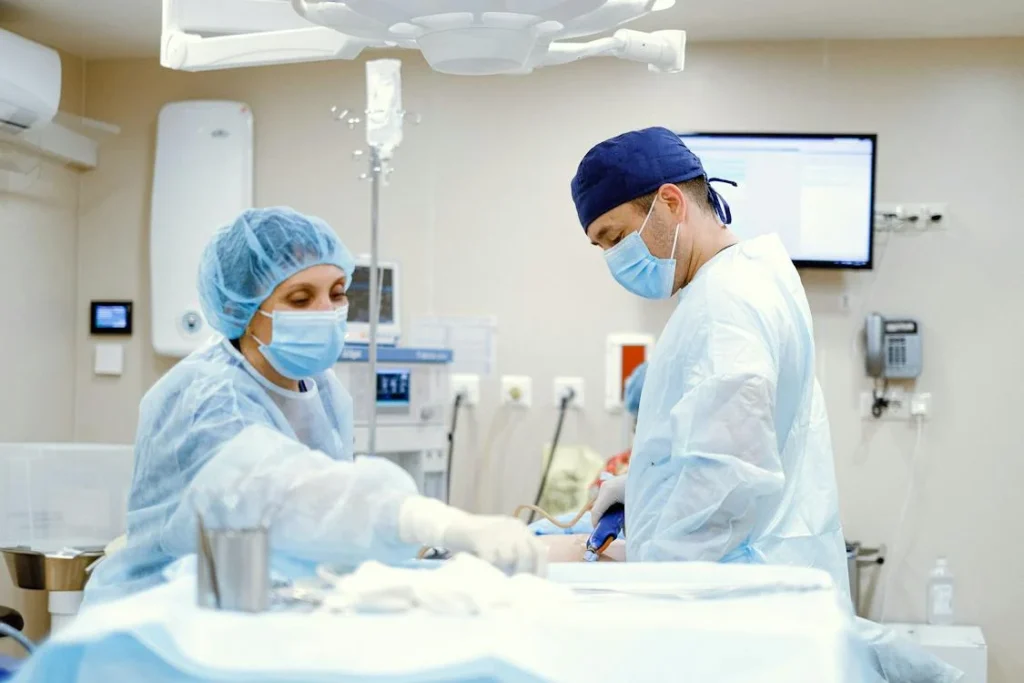What is Heart Valve Replacement Surgery: Preparation, Procedure, & Recovery

A leaky heart valve, also known as valve regurgitation, occurs when a heart valve fails to close properly, resulting in the backward flow of blood between the heart chambers. The severity of the leak determines the availables treatments, ranging from medications to surgical interventions like heart valve replacement surgery or heart valve repair surgery.
While the heart comprises four valves, the aortic and mitral valves are the ones most frequently subjected to replacement procedures. Mitral valve regurgitation, impacting 24 million individuals globally, is a common form of leaky heart valve condition. On a global scale, around 280,000 procedures of heart valve replacement surgery take place each year, with the mitral and aortic valves being the most commonly substituted.
While a leaky heart valve can be asymptomatic, necessitating no immediate treatment, regular monitoring allows for timely intervention if the condition worsens. Severe cases often require surgical procedures to either repair or replace the valve. The heart valve replacement surgery involve the use of replacement valves, which can either be synthetic or obtained from a biological source, such as a human or animal donor.
Therefore, it’s vital to embrace a thorough and accurate understanding of the intricacies associated with heart valve replacement surgery before proceeding for it. In the following article, we help you understand the importance and complexities of this procedure.
What is Heart Valve Replacement Surgery and why is it needed?
Heart valve replacement surgery treats the valve that is either too constricted or doesn’t close properly. It is performed to manage the heart valve diseases, which can manifest in two primary forms:
- Narrowing of a valve (stenosis)
- Leaking of a valve, allowing backward blood flow (regurgitation)
Individuals may require heart valve replacement surgery if the disease is impacting the heart’s ability to effectively pump blood. Efficient valve function is essential for guiding blood flow in the correct direction through the heart. Surgical options for heart valve procedures encompass open-heart surgery, minimally invasive techniques, or accessing the heart through veins.
In cases where there are no apparent signs or symptoms or the condition is mild, doctors may recommend regular monitoring along with lifestyle adjustments and medications to manage symptoms. In some cases, this heart surgery may be advised even in the absence of symptoms, especially if the individual is undergoing surgery for another heart-related condition. The decision to undergo the surgery, including the consideration of minimally invasive procedures, is a collaborative discussion between the patient and the doctor. Eventually, the affected valve may need repair or replacement, a decision that depends on the specific circumstances.
When possible, heart valve repair is often preferred, as it preserves the natural valve and may maintain heart function. However, there are situations where valve replacement becomes necessary and is deemed the most effective option. Doctors also assess whether minimally invasive heart surgery is suitable for the patient, discussing the potential benefits and risks associated with each procedure.
What Are The Types Of Heart Valve Replacement Surgery?
Here are the types of heart valve replacement surgeries:
- Transcatheter Aortic Valve Replacement (TAVR): The approach involves navigating thin tubes, known as catheters, through an artery near the groin to access the aortic valve.
- Bioprosthetic Valve Replacement: In cases where the initial tissue replacement valve shows signs of wear, a second valve can be implanted through a catheter-based, minimally invasive method.
- Transcatheter mitral valve replacement: It is a medical procedure that involves replacing the mitral valve of the heart using a minimally invasive approach using catheters.
- Mechanical Valve Replacement: It involves using an artificial valve made of durable materials like metal or ceramic. These valves last a long time, but patients need to take blood-thinning medications for life to prevent blood clots.
- Biological Valve Replacement: It uses a valve made from animal tissue (usually a pig or cow) or from a human donor. Patients might not need blood-thinning medications for life, but these valves may not last as long as mechanical ones.
What Does The Preparation Procedure For Heart Valve Replacement Surgery Involves?
Discuss with your doctor the following aspects before undergoing heart valve replacement surgery:
- Clarify the timing for your regular medications and whether they can be taken before the surgery.
- Provide information about any allergies or adverse reactions to medications you may have experienced.
- Consult your healthcare provider regarding the specific medications permissible before the surgery.
- Determine the appropriate time to refrain from eating or drinking the night before the surgery. It’s essential not to consume any food or beverages after midnight on the day of the surgery.
- Additionally, you might undergo pre-surgery assessments such as a chest X-ray, echocardiogram, and electrocardiogram (EKG) on the day before the surgery. Other diagnostic tests like a CT scan, heart catheterization, and lab tests may also be conducted.
What is The Surgical Procedure Behind Heart Valve Replacement Surgery?
You will be administered anesthetics to induce a sleep-like state for the procedure, and a heart-lung bypass machine will be employed to maintain blood circulation throughout.
If your heart valve is not amenable to repair, and a catheter-based procedure is not viable, replacement of the valve may become necessary. In this process, your doctor removes the impaired heart valve and substitutes it with either a mechanical valve or a valve crafted from the tissue of cow, pig, or human hearts (biological tissue valve).
Biological valves may require eventual replacement due to natural breakdown over time. In the case of a mechanical valve, lifelong intake of blood-thinning medications is necessary to prevent blood clots. Your doctors will engage in discussions with you to weigh the risks and benefits associated with each type of valve.
Heart valve replacement surgery can be conducted through standard open-heart surgery, which entails an incision in your chest through the breastbone. Alternatively, minimally invasive heart surgery involves smaller incisions compared to open-heart surgery. Certain heart valves may be replaced through a minimally invasive catheter procedure. For instance, a catheter-based approach might be employed to introduce a replacement valve into a biological valve in the heart that is malfunctioning.
Minimally invasive heart surgery encompasses procedures using elongated instruments inserted through one or more small chest incisions (thoracoscopic surgery), surgery through a small chest incision, or surgery conducted with robotic assistance (robot-assisted heart surgery).
Opting for minimally invasive heart surgery may result in a shorter hospital stay, faster recovery, and reduced pain compared to open-heart surgery. It is advisable to undergo minimally invasive heart surgery at medical centers with experienced medical teams proficient in performing such procedures.
What Should I Expect During The Recovery From Heart Valve Replacement Surgery?
- Following heart valve replacement surgery, your doctor will provide guidance on the appropriate timing for your return to regular activities.
- It is essential to attend scheduled follow-up appointments with your doctor, during which several tests may be conducted to assess and track your overall condition.
- Your healthcare provider might suggest adopting a heart-healthy lifestyle, incorporating changes such as:
- Maintaining a nutritious diet
- Engaging in regular exercise
- Effectively managing stress
- Abstaining from tobacco use
What Is Cost of Heart Valve Replacement Surgery In India?
India is home to a multitude of healthcare institutions accredited by ISO, JCI, and NABH, guaranteeing patients exceptional standards in treatment and post-operative care. The adeptness of Indian medical professionals, including doctors and nurses fluent in English, ensures smooth communication throughout the medical journey, alleviating concerns about quality. Therefore, people worldwide have excellent chances to access these services from the best doctors for heart valve replacement surgery and best hospitals for heart valve replacement surgery in India.
Moreover, the cost of heart valve replacement surgery in India is generally more affordable than Western nations, while still maintaining world-class quality. The typical price range for such procedures in India spans from INR 2.97 lakh ($3600) to INR. 10,00,000( $ 12,578).
To Summarize
Ensure you locate a skilled cardiac surgeon who can collaborate closely with you to strategize your surgery and promote a swift recovery. Trust Medflick as your reliable resource for accurate, up-to-date, and dependable information on heart valve replacement surgery or any other health-related topics. Your health and overall well-being merit nothing less than informed and conscientious guidance.




